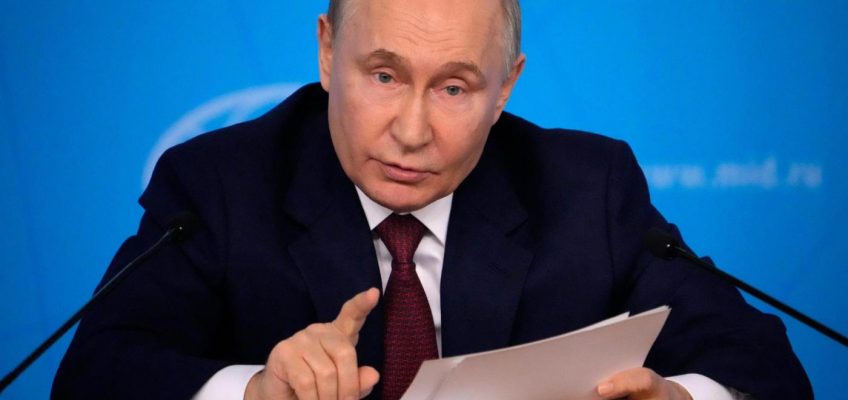Before heading off to North Korea last week, Russian President Vladimir Putin made a “peace” offering to Ukraine.
He pledged an immediate cease-fire and peace negotiations if Ukraine withdraws from four partially occupied regions and abandons its bid to join the North Atlantic Treaty Organization. His other stipulation, of course, is that the West lift sanctions. This offer was patently designed to tempt and divide Ukraine’s friends. No one should fall for it.
Sadly, wars don’t always end justly. It’s likely, however lamentable, that some form of territorial concessions will be part of a negotiated end to the war Putin started. That must be Ukraine’s decision to make.
But it’s preposterous for Putin to demand such concessions before talks can even begin. Moreover, if talks ever do get started, Putin’s offers should be viewed with utmost skepticism. Nine out of 10 Ukrainians say they don’t trust him, and they’re right: He has an unblemished record of using negotiations to regroup and plan the next assault.
The U.S. and its friends need to show they understand this. There’s been some progress. At the recent Group of 7 summit in Italy, the U.S. and Japan signed 10-year security agreements with Ukraine, signaling determination to stand by Kyiv.
The allies are working on finding responsible ways to use frozen Russian assets to bolster Ukraine’s finances. And there are belated moves to tighten sanctions, which still have far too many holes, allowing Putin to amass more resources for his war.
The Biden administration’s decision to let Ukraine use U.S.-supplied weapons against military targets inside Russia was another long-overdue shift. As French President Emmanuel Macron recently said, there’s no point in giving Ukraine weapons and then refusing to let it defend itself.
Indeed, Washington’s lifting of restrictions doesn’t go far enough: It’s limited to forces targeting Kharkiv, Ukraine’s second-largest city, which has come under heavy aerial bombardment. The same logic should be applied, at a minimum, to other frontline areas near the border.
Bolstering Ukraine’s capabilities will also require critical ammunition supplies (which are now starting to arrive) and stronger air defenses. Russia’s air force is playing a bigger role and its attacks are becoming more indiscriminate: 3,000 highly destructive glide bombs rain down on the country every month. Ukraine also needs more help in training and equipping reserves and new recruits.
Europe should give more thought to future-proofing its support. This demands changes in defense planning, coordination and production — so the Continent can serve its own defense needs, support Ukraine and deter Russia in the long term. Assisting in Ukraine’s reconstruction will be another major challenge. Efforts to repair, rebuild and demine need to get going: This work cannot wait for the war to end.
Putin has flooded the battlefield with ill-trained and badly equipped forces; nurtured alliances with Iran, North Korea and China; and launched indiscriminate attacks against civilian targets. His capacity for destruction is impressive. But the costs of his war are mounting for Russia as well, and becoming ever harder to disguise. Time isn’t necessarily on his side.
Putin’s actions speak volumes. His proposal for talks in exchange for territory should be read as just his latest attempt to divide the allies and throttle Western support. Thanks, but no thanks.
— The Bloomberg Opinion Editorial Board
Related Articles
Trudy Rubin: Ukraine’s head of military intelligence is behind Kyiv’s biggest victories this year. He sees no point in peace talks
Russia obliterates Ukraine’s front-line towns faster with hacked bombs and expanded air base network
Trudy Rubin: Ukraine’s volunteer spirit buoys its fight against Russia
78 countries at Swiss conference agree Ukraine’s territorial integrity must be basis of any peace
Putin offers truce if Ukraine exits Russian-claimed areas and drops NATO bid. Kyiv rejects it


Leave a Reply